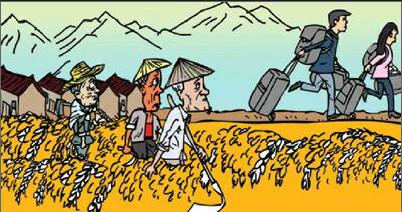Is the Dearth of Young Rural Labor Worrisome?

Recently, a study by the Beijing-based Economic Information Daily found that in many Chinese provinces—such as Jiangxi, Anhui, Sichuan and Hubei—there are few young people to be seen in rural areas. Farmland is mostly cultivated by farmers in their 50s and 60s.
Given that agriculture is of pivotal importance to the national economy, this situation has caused concern. The worries are that, as current farmers age, the younger generation is not learning the skills needed to feed Chinas massive population.
However, others argue that with the modernization of agriculture and the resulting increase in efficiency, its natural to see a decline in the number of young farmers, as farm work no longer requires as large a workforce. Efforts should therefore be made to further modernize the countrys farmland, so that output can continue to remain stable even if fewer young adults wish to work on farms.
Concerning trend
Tong Qijun (China Youth Daily): When making career plans, young people rarely consider the life of a professional farmer, even though they are stronger—both financially and technically—and thus more capable of coping with risks in the agricultural sector such as various natural disasters. In reality, they face a series of issues: irregularities in the transfer of land-use rights; poor infrastructure; and difficulties in applying for loans, among others. As a result, being a farmer in China is a hard job that is disliked by most people in the countryside, not to mention the perception of being one of the most underprivileged groups in society.
If young people all frown on the idea of being career farmers, who can we expect to plant rice for the 1.3 billion Chinese people? At any stage of economic development, the status of agriculture as the basis of all other sectors should never be weakened. Indeed, more attention should be paid to the absence of young people from farm work in rural areas.
Han yuyin (www.rednet.cn): Its impossible to prevent young people from leaving their villages. Farm work is hard and to be a farmer is not considered a “decent job.” In most rural areas, if he comes back to his village to be a farmer after graduating from college, this young person will be looked down upon in the village and his parents will feel ashamed of their son.
Meanwhile, its undeniable that there are many obstacles that prevent farmers from improving their lot. Chinese farmers own farmland through their collective, often a village committee, which distributes land-use rights to farmer families through fixed-term contracts. Under these contracts, however, its almost impossible to develop a large-scale, modern agricultural industry. Poor basic infrastructure in most rural areas also contributes to this problem. As a result, being a farmer is among the leastconsidered choices for a career.endprint
Also, agriculture is too dependent on weather and climate for good harvests, coupled with changes in the market. Farmers in China have to undertake a lot of risks. Due to these dangers, farmers find it difficult to get loans from banks, hindering their development even if they have good plans. As a result, farm work is often left to seniors, as young people prefer to seek a career in cities.
Although we have seen grain harvests year after year, food security remains an important issue. Feeding 1.3 billion people is not an easy job. At a time when an increasing number of young people leave rural areas for cities, the issue should be seen from a strategic perspective.
How can we make farming a respected profession? Its important to improve living conditions in rural areas, so that farmers can have easy access to medical services, education and entertainment. To persuade more young people to become farmers, they should be provided with a broader platform and support to make them feel that farming is a viable career.
Better choices
Guo yuanpeng (Legal Daily): Its an undeniable fact that nowadays, fewer and fewer young people are engaged in farm work in rural areas. However, it seems unnecessary to worry about the lack of farmers to carry on with agriculture in the future.
When farmers no longer rely solely on land for opportunities, other new developments are expected to come. Feeling the approach of fresh opportunities, the government is now pushing forward new models of agricultural development across the country. For instance, it is standardizing the transfer of land-use rights to facilitate the creation of large farms.
Since cities are producing more and more jobs for people from the countryside, their separated arable land can be combined together to make big farms. Investors, including individuals and enterprises, will come to operate these farms. Farmers can be paid in rent for their land while living in cities. More importantly, the use of land by people of expertise will greatly help increase productivity, thus accelerating the pace of agricultural modernization.
liu yijie (China Youth Daily): Many people are worried about the current situation in rural areas where young adults are no longer showing any interest in working on the farms they grew up on.
Most young people are now working in cities, leaving behind seniors and children in rural areas. The reason for this lack of labor in the countryside is simple: They can earn much more money as migrant workers than as farmers.endprint
Against the backdrop of rapid urbanization, the shrinking of the rural population seems an unavoidable trend. The priority now facing China is to increase input into infrastructure in rural areas, so as to narrow the income divide between urban and rural areas. When rural areas are fully developed, the lack of young farm workers wont be an issue anymore.
Zhang Zhang (Guangzhou Daily): Agricultural production is the basis for a countrys development and the importance of agriculture is obvious. However, there is no need to overreact to claims that well have no farmers in the future.
Recent years have seen a continuous rise in agricultural production. When it comes to the proportion of the agricultural population, in countries like Japan and the United States, approximately 2 percent of their whole popula- tions are engaged in agriculture. At the end of 2006, the number of people working in Chinas agricultural sector stood at 348 million, accounting for 27 percent of the countrys total population. The comparison shows that we may have more farmers than we need.
Those who worry that no one in the future will plant rice for the Chinese might have seen only the reduction of farmers working directly in fields, while neglecting that in modern agriculture, the agricultural chain is composed of many parts, not only land farming. When fewer farmers are seen working on the farmland, new sectors related to agriculture are growing, such as the application of various technologies to the industry.
As for young people, whether it is because of the rapid pace of urbanization, or because of personal interest, their choice to move to cities is understandable. Cities provide more job opportunities and bigger space for personal development. With the mechanization of the agricultural industry, efficiency is growing, and thus fewer farmers are needed than before. young people, who are quick at learning new things, can transfer to other industries and help develop these sectors.
The outflow of young people has led to problems like seniors and children being left behind without help. Despite these problems, however, the young still choose to go to cities in order to find a better life for themselves and their families. Therefore, the solution is more support for rural areas to bridge the gap between cities and the countryside.endprint

